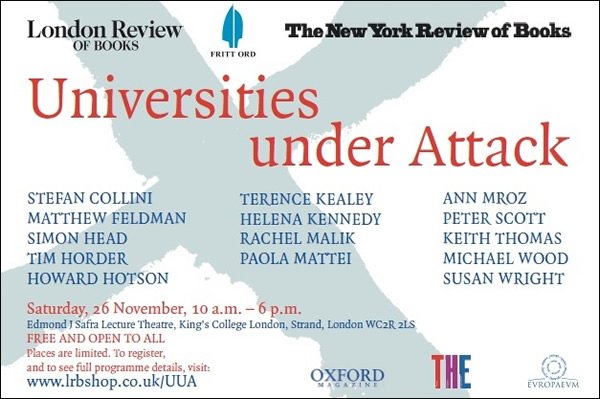Universities under Attack
What exactly is under attack and who are the attackers? The ‘radical reform’ of our university system is of long duration and has its origins in the Thatcher years. We should not forget that in January 1985 Oxford’s Congregation voted 738-319 to deny Mrs. Thatcher an honorary degree on the grounds that her government had ‘done deep and systematic damage to the whole public education system in Britain’. In succeeding decades ‘reform’ has been driven forward by governments of all political persuasions, but it is less well understood that many of these reforms have been undertaken in alliance with, and in the interests of, British business.
While the policies of this government/business alliance are carried out in a local, British setting, the policies themselves are part of a worldwide phenomenon linked to two of the dominant forces of our time: economic globalization and the managerial revolution driven by information technology. Among the core meanings of globalization is the intensification of international economic competition brought about by the rapid industrialization of China, India and the BRIC countries. A sense of vulnerability to this competition is common to all the established industrial economies, and especially Britain, with its long history of declining industrial competitiveness.
A commitment to improving British competitiveness has therefore been a shared goal of the government/ business alliance for the past thirty years. So for example in 2009 universities were directly subordinated to a new Department of Business, Innovation and Skills. A year later there was the dramatic reallocation of research funding in favour of STEM, seen a profitable to business, at the cost of the humanities and the social sciences. Evidence of political interference in research agenda is proliferating, most obviously with the AHRC’s ill-judged embrace of Cameron’s nebulous ‘Big Society’. The funding of university teaching is also undergoing radical change as the funding burden shifts from the state to the student. Students become consumers, teachers become ‘service providers’ and the love of learning is displace by what David Willets calls ‘the power of consumerism’.
The managerial revolution brought about by information technology is another key component of reform. With the mediation of white collar work by computers and computer networks, this managerial revolution is above all a revolution of quantification which applies to the nonmanufacturing economy the strict regimes of measurement, targeting and control hitherto largely confined to the factory floor. HEFCE’s control regime, via the RAE/REF, is an example of quantification applied to higher education, serving one of the government/business alliance’s chief objectives: to make the universities more like business in the way they conduct their affairs, including their core activities of teaching and research. The HEFCE control regime relies on a proliferation of Key Performance Indicators whose targets must be met if a university department’s research is to be fully funded. This has led to the measurement and targeting of a scholar’s research output; measurement of the time taken by the scholar to do the research; of the money the research brings in; of the indices of impact and esteem surrounding the research; of the grades (1*-4*) awarded the research by HEFCE’s RAE/REF panels.
Although many of these trends have been at work since the mid-1980s, the thirty-years’ war of attrition, pitting universities against the business-government axis has over the past year turned into a Blitzkrieg as the government seizes the opportunity of a funding crisis to push through dramatic and irreversible changes before the universities can organise effective resistance. How, then, to respond? In a parallel universe in which university administrators still gave priority to academic priorities and concerns, one could imagine the Russell Group or Universities UK organising a major conference in London to subject these radical changes to sustained, collective scrutiny. One could also imagine Britain’s premier academies of arts and sciences helping to forge all the other learned society into a body capable of defending academic values with a single voice.
Without the leadership and resource of national institutions, academics’ attempts to organise a collective response to this crisis have been largely unsuccessful. And in an era of retrenchment, the removal of tenure and the heavy hand of managerialism have left many individual academics fearful that free expression of their concerns could cost them their jobs. Whatever the reason, when the history of the current crisis of HE comes to be written, one central theme will be the failure of institutionalised structures of academic leadership to offer timely, concerted and effective opposition to what is being done to the institutions and disciplines which it is their duty to protect and nurture.
The coalition of sponsors funding this conference, all but one of them outside universities, is stepping into the vacuum. What unites them is a strong commitment to free speech and its defence against its enemies, whether in the form of political and religious intolerance, or more subtle enemies in the form of managerialism, whether public or private, with its shared commitment to the values of business utilitarianism. Whether we like it or not Britain has become a pivotal battleground in a global conflict. How effectively universities under attack defend themselves in coming months will influence the fate of even more vulnerable university systems elsewhere.
MARY-KAY WILMERS, EDITOR, THE LONDON REVIEW OF BOOKS
SIMON HEAD, DIRECTOR OF PROGRAMMES, THE NEW YORK REVIEW OF BOOKS FOUNDATION
HOWARD HOTSON, FELLOW, ST ANNE’S COLLEGE, OXFORD.
PROGRAMME
10.00–11.30 PANEL I; Universities in a Corporate World.
Participants: Howard Hotson, Simon Head, Michael Wood.
Moderated by Tim Horder.
11.30–12.00 Coffee Break
12.00–1.30 PANEL II; What Kind of University?
Participants: Stefan Collini, Helena Kennedy, Peter Scott.
Moderated by Paul Flather.
1.30–2.30 Coffee break
2.30–4.00 PANEL III; HEFCE and the RAE/REF: Academic Labour as a Factor of Production?
Participants: Matthew Feldman, Paola Mattei, Rachel Malik.
Moderated by Ann Mroz.
4.-4.30 Coffee Break
4.30–6.00 PANEL IV; Beyond the White Paper: What Is To Be Done?
Participants: Keith Thomas, Terence Kealey, Susan Wright.
Moderator: Peter Scott
END OF CONFERENCE
Participants
STEFAN COLLINI is Professor of English Literature and Intellectual History at Cambridge, and a Fellow of Clare College. He is the author of ‘Absent Minds: Intellectuals in Britain’ OUP (US, UK) 2006; ‘Common Reading: Critics, Historians, Publics’, OUP (US, UK) 2008; and ‘What are Universities For’ ? Penguin (US, UK) 2012, forthcoming.
MATTHEW FELDMAN is Senior Lecturer in Twentieth Century History at the University of Northampton and Editor of the online journal ‘Compass: Political Religions’. He is the author of ‘Modernism and Propaganda 1914-1945’, Palgrave (UK), 2012, forthcoming; and “’Beckett’s Books: A Cultural history of Samuel Beckett’s ‘Interwar Note’”, Continuum (UK) 2006.
PAUL FLATHER is Secretary General of the Europaeum, which promotes academic links and research collaboration between ten leading European universities. He was founding Secretary General of the Central European University in Budapest, 1994, and has been Deputy Editor of the New Statesman. He is a Fellow of Mansfield College, Oxford.
SIMON HEAD is Vice President and Director of Programmes for the New York Review of Books Foundation. He is a Scholar at the Institute for Public Knowledge at New York University, and a Senior Member of St Antony’s College, Oxford. He is the author of ‘The New Ruthless Economy: Work and Power in the Digital Age’, OUP (US, UK) 2005.
TIM HORDER is Editor of Oxford Magazine. He is an Emeritus Fellow of Jesus College, Oxford and was formerly a Senior Research Fellow in Medicine at Oxford. He is the author of ‘Why do Scientists Need to be Historians?’ Quarterly Review of Biology, (1998), and ‘History of Developmental Biology’, Wiley Online Library, (2010).
HOWARD HOTSON is Professor of Early Modern Intellectual History at Oxford, and a Fellow of St Anne’s College. He was Professor of Early Modern History at the University of Aberdeen, 2002-2005. He is the author of ‘Paradise Postponed: Johan Heinrich Alsted and the Birth of Calvinist Millinarianism’, Kluwer Academic Publishers (The Netherlands) 2000, and ‘Commonplace Learning: Ramism and its German Ramifications’, OUP (UK, US) 2007.
TERENCE KEALEY has been Vice Chancellor of the University of Buckingham since 2001 He was previously Lecturer in the Department of Clinical Biology at Cambridge. He is the author of ‘The Economic Laws of Scientific Research’ Palgrave Macmillian UK) 1996, and ‘Sex, Science and Profits’, William Heinemann (UK) 2008.
HELENA KENNEDY, QC, was created a Life Peer in 1997 and sits in the House of Lords as Baroness Kennedy of the Shaws. She was appointed Principal of Mansfield College, Oxford in July 2010. She is President of the Helena Kennedy Foundation which provides financial bursaries, mentoring and support for disadvantaged students. She was Chair of the British Council, 1998-2004, and Chancellor of Oxford Brooks University, 1994-2001. She is President of the Board of Governors of the School of Oriental and African Studies (SOAS).
RACHEL MALIK has been Senior Lecturer in English Literary Studies at Middlesex University. She is the author of ‘We are too Menny: Literature’s Proletariat’ New Left Review, July-August 2004; and ‘The Afterlife of Wilkie Collins’ in Jenny Bourne Taylor (ed.) ‘The Cambridge Companion to Wilkie Collins’, CUP (UK) 2006.
PAOLA MATTEI is University Lecturer in Comparative Social Policy at Oxford, and a Fellow of St Antony’s College. She has been a Research Fellow at the University of Bremen and the London School of Economics. She is the author of ‘Restructuring Welfare Organizations in Europe: From Democracy to Good Management’, Palgrave Macmillan (UK) 2009.
ANN MROZ is Editor of the THE (Times Higher Education Supplement). She was Deputy Editor at the time of the relaunch of the THE as a magazine in 2008.
PETER SCOTT is Professor of Education at the Institute of Education, University of London. He was Vice Chancellor of the University of Kingston, 1998-2010 and Editor of the THE 1976-1992. His is the author of ‘The Meanings of Mass Higher Education’ Open University Press (UK) 1995; and ‘Re-Thinking Science: Knowledge and the Public in the Age of Uncertainty’, Polity Press (UK) 2001. He was Knighted in 2007.
KEITH THOMAS is a Distinguished Fellow of All Souls College, Oxford. He was Professor of Modern History at Oxford, and President of Corpus Christi College, Oxford 1988-2000. He is the author of ‘Religion and the Decline of Magic: Studies of Popular Beliefs in Sixteenth and Seventeenth Century England’ (Weidenfeld and Nicolson (UK) 1971; Scribner (US) 1971; and ‘The Ends of Life: Roads to Fulfillment in Early Modern England’. OUP (UK, US) 2009. He is a Fellow of the British Academy and was Knighted in 1991.
MICHAEL WOOD is Professor of English and Comparative Literature at Princeton. He was Professor of English Literature at The University of Exeter, 1982-1995. He is a Fellow of the Royal Society of Literature, and US Delegate in Literature at OUP. He is the author of ‘Yeats and Violence’, OUP (UK, US) 2010, and ‘The Road to Delphi: The Life and Afterlife of Oracles’, Farrar Straus, Giroux (US) 2003, Chatto and Windus (UK) 2004.
SUSAN WRIGHT is Professor of Educational Anthropology at the Danish School of Education at the University of Aarhus, and was Lecturer in Social Anthropology at the University of Sussex, 1985-1997. She was a member of the Foundation Working Party to establish UK-UNESCO, 1998-9. She is the author of ‘Measurements and Distortions: A Review of the British System of Research Assessment’, Danish University Press (Denmark) 2008; and ‘The Anthropology of Organizations’ Routledge (UK) 1994.




